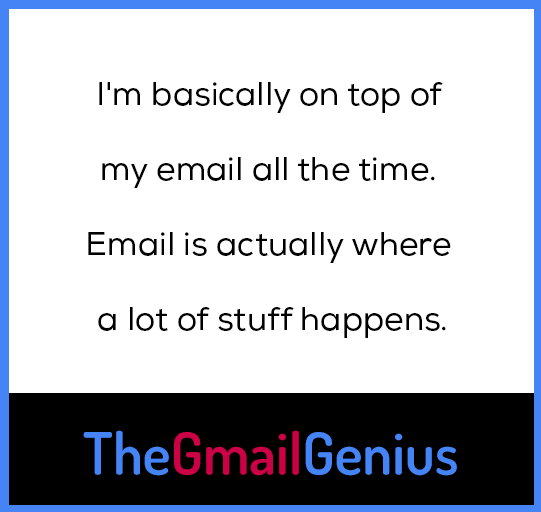How I Email: Niraj Ranjan Rout, Co-Founder and CEO, Hiver
Email is a non-negotiable part of everyday life. For some, it’s an unruly time suck, but enlightened email users have systems to ensure they’re not a slave to the inbox. We’re asking smart thinkers to give us a peek inside their inboxes, share tips, ideas, gripes, and everything in between.
Niraj Ranjan Rout is the co-founder of Hiver, a tool to help teams manage email efficiently. He admits to spending a large portion of his days in his inbox and estimates that 80 percent of the emails he receives get a almost immediate response.
What’s your approach to inbox management on a day-to-day basis?
 So, how frequently I look at email and how frequently I act on email has evolved over the last couple of years or so.
So, how frequently I look at email and how frequently I act on email has evolved over the last couple of years or so.
Two years back, I was coding a lot of our software and I needed a lot of blocks of time where I had no distractions at all. Now I’ve moved to a point where actually I need to be on top of a lot of stuff like hiring, customer conversations, sales. With all of that, email is a very, very key part.
I’m basically on top of my email all the time, I don’t set scheduled times when I check my email. It takes up a good part of my work day. If it’s an important email, I’ll reply within five minutes. That is the kind of responsiveness and dependence I have on email at this point of time.
About 20 percent of my emails are basically put away for dealing with later using a snooze feature. I deal with around 80 percent of it immediately.
How do you stay productive when so much of your job depends on you being responsive to email?
I have learned this art of blocking — basically reserving blocks of time for stuff when there should be no distractions.
If I’m writing a document or working on stuff which requires intense attention, I stop looking at email for 30 minutes. If it’s some brainstorming that needs to be done, a deep discussion that is going on, I’ll completely go off email for a certain block of time.
But, the rest of my time is spent a lot on email — talking to customers, talking to investors and people within the company. Email is actually where a lot of that stuff happens.
For the average Gmail user, what are some of the most underutilized features that could help with productivity?
The feature that is under-used is search. If you look at Gmail, how it was built and how it evolved over Outlook, it basically changed the paradigm of how we deal with email. If you talk to most Outlook users, they just get very uncomfortable when they see a lot of emails in front of them, they immediately, compulsively file them into folders.
Gmail came up with this approach where search was very, very powerful and you had a huge amount of storage available. But, tons of Gmail users are still stuck in the position where they are compulsively filing emails into labels or folders. I think that approach is fundamentally wrong for Gmail. If you are very conversant with how the Gmail search works and if you know how to use search to find stuff, you can get away from a lot of filing of emails into folders and labels, and that can save you a lot of time and attention.
Accurately filing emails under labels can not just be cumbersome, it can also be confusing, because a single email might fit under many labels. Just coming up with a list of labels which are mutually exclusive can be complicated and confusing.
If you rely on Gmail’s search function, you can quickly run out of space because there’s no reason to delete emails, right?
Personally, I don’t see any reason to delete anything. I think everything is fine staying in my email and it’s available for recovery even 10 years down the line. It’s so comforting to me that I can find an email. Space is very cheap. Rather focus on your work and rather have the flexibility of finding anything that you want.

Where do you think email is going in the next 5-10 years?
People have written stories proclaiming the end of email for year. Email should have been dead and buried, but it is stronger than ever, right? It’s not that email is just sticky and everyone is used to it, email has some very fundamental strengths.
It’s available to everyone, so it can cross the boundaries of companies and organizations, and also go from one team to another in a single organization. It’s also very neatly structured, with a subject, and a conversation under a subject. Plus, its asynchronous — so it does not come with an expectation of an immediate response. All of these factors make email very strongly differentiated against the crop of new collaboration tools like Slack.
I believe email is going to stay very strong in inter-organization communication, and also in communication between multiple teams in a single organization. There is a huge opportunity in making email better in handling all of use cases that fall under these areas — customer support, sales, hiring come to mind immediately.
With email being so open because of the API and with tools being built on top of it, people have basically realized in the last four or five years that email is not a tool but actually a platform. More specifically, Gmail is a platform on which you can build more tools. I think that is the largest part of the evolution — people are building deep solutions on top of Gmail. I think that is one direction that things will very strongly move in over the next 5 to 10 years.